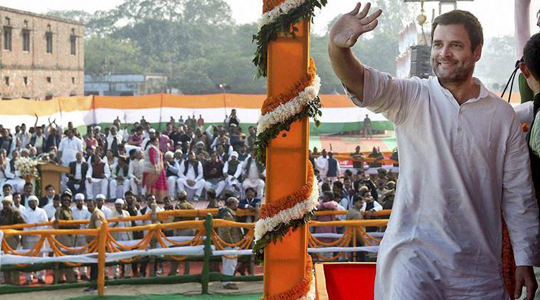Mehsana/new Delhi, Dec 22: More than a month after Delhi Chief Minister Arvind Kejriwal alleged in the Delhi Assembly that Narendra Modi, as Gujarat Chief Minister, received money from the Sahara and Birla groups, and a week after the Supreme Court said it didn’t see “even the smallest material” to substantiate the charge, Congress vice president Rahul Gandhi repeated the allegation Wednesday.

Addressing a rally in Mehsana in the Prime Minister’s home state, Rahul alleged that in the records with the Income Tax, there were notings of Sahara officials’ claims that they paid Modi nine times between October 2013 and February 2014, and that the total amount was Rs 40 crore.
He also alleged that according to the documents with the I-T department, the Birla Group too paid Rs 12 crore to the then Chief Minister. Seeking an independent inquiry, Rahul said he was raising the issue “on behalf of the country”.
“You (Modi) did not allow me to speak in Parliament… you did not want to face me in the House. I will tell you the reason. Any business entity keeps records of its transactions. On November 2014, the Income Tax department conducted raids on Sahara and found some documents. I want to share with you the contents of the documents. There were several entries in those documents, which I am reading out before you,” he said.
Rahul then alleged that another record suggested that the Birla Group gave Rs 12 crore to ‘Gujarat Chief Minister’. “This record is with the I-T department… the I-T even recommended an inquiry… I want to ask you why no such inquiry was done,” he said.
“You doubted the honesty of citizens, their hard-earned income, and made them stand in queues. Now, on behalf of citizens, I am asking you whether the information is true or not. And if it is true, then when will you set up an inquiry,” he said.
In New Delhi, the Congress sought to amplify its vice president’s allegations and asked the Prime Minister to “come clean like Sita”.
Congress communication department head Randeep Surjewala told reporters: “We too want the Prime Minister to remain beyond any doubt… If the Prime Minister says that I have not taken any money and is ready for a probe… then let there be an impartial probe by an independent agency which the nation trusts.”
Meanwhile, Kejriwal said he was the first to raise the matter in the Delhi Assembly on November 15, and that he had since been saying it at his rallies in different parts of the country.
“Aage aage chalein hum, peeche peeche Congress aa rahi hai. Himmat dikha rahi hai. Achchi baat hai (We are walking ahead, the Congress is following us. It is showing courage. It is a good thing),” he said.
Kejriwal urged the Supreme Court to take suo motu cognisance, appoint a special investigation team and monitor the probe into the papers with the I-T.





Comments
If this is a lie, let modi file a defamation case against Rahul and teach him a good lesson ..... The 56\ chest is not pumping properly ..
Or else I request Naren and Bupa to take modi to a temple and make him to take an oath there, saying he has not taken any bribe.....Dood ka dood , Pani ka Pani ho jaye ...."
Add new comment